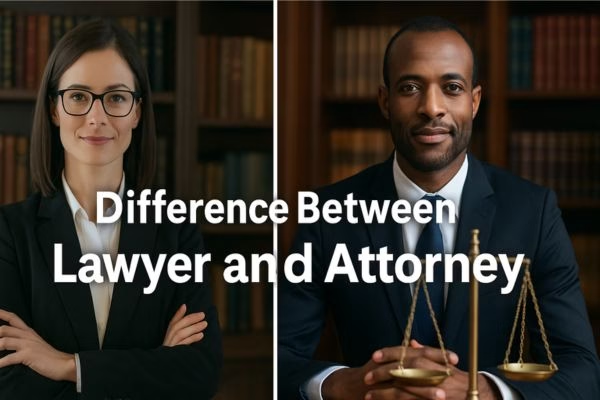In the world of law, the terms lawyer and attorney are frequently used, often as if they mean the same thing. But are they really identical? Not quite. While they share similarities, there are key differences that matter—especially in 2025, when the legal profession is becoming increasingly specialized, global, and tech-driven.
Whether you’re looking for legal assistance or exploring a career in law, understanding the difference between lawyer and attorney can help you make more informed decisions. This blog breaks down the distinction clearly, with real-world examples and updated context for today’s legal environment.
Who is a Lawyer?
A lawyer is a person who has studied the law and holds a law degree. This individual has gone through formal legal education and has learned how to interpret and apply the law. However, a lawyer may not necessarily be certified to represent clients in court unless they pass specific licensing exams in their country or state.
Primary Roles of a Lawyer:
Giving legal advice on contracts, disputes, and regulations
Drafting legal documents such as wills, leases, and agreements
Conducting legal research and case analysis
Working in non-litigation roles like policy, compliance, and corporate consulting
Lawyers may work in law firms, corporations, educational institutions, or public policy organizations. They form the foundation of the legal profession but are not always involved in courtroom litigation.
Who is an Attorney?
An attorney (or attorney-at-law) is a lawyer who has received additional certification or licensing that permits them to practice law in a courtroom and officially represent clients.
In most legal systems, becoming an attorney involves passing a licensing exam (such as the bar exam in the India) and meeting the requirements set by a governing legal authority.
Key Duties of an Attorney:
Representing individuals and organizations in court
Defending or prosecuting in legal disputes
Handling litigation, negotiations, and trial processes
Preparing legal strategies for civil or criminal matters
Essentially, all attorneys are lawyers, but not every lawyer becomes an attorney.
The Key Difference Between Lawyer and Attorney
Let’s break it down in simple terms:
| Aspect | Lawyer | Attorney |
|---|---|---|
| Education | Completed formal law education | Completed legal education + passed a licensing exam |
| License to Practice | May not have license to represent clients in court | Legally authorized to represent clients in court |
| Scope of Work | Legal advice, documentation, research | Litigation, court representation, legal consultation |
| Jurisdiction | Varies—depends on local legal system | Strictly regulated—must meet legal board requirements |
Global Context: How This Differs by Country
United States
Lawyer: Has a Juris Doctor (JD) degree.
Attorney: A JD holder who has passed the state bar exam and is licensed to practice in court.
India
Lawyer: Has an LL.B degree.
Advocate (similar to attorney): Must be registered with the Bar Council of India to represent clients.
United Kingdom
Lawyer: A broad term covering both solicitors and barristers.
Solicitor: Provides legal advice and handles paperwork.
Barrister: Appears in court on behalf of clients.
Each country uses slightly different terminology, but the core idea remains: only some legal professionals are licensed to act in court on behalf of others.
Law and Technology in 2025
With digital transformation reshaping the legal landscape, lawyers and attorneys today use tools that make their work faster, more accurate, and more efficient.

Examples of Legal Tech in Action:
AI Legal Assistants: Help draft and review contracts within minutes.
Virtual Courtrooms: Attorneys attend hearings remotely from any location.
eDiscovery Tools: Quickly scan thousands of pages of documents to find relevant case law.
In 2025, legal professionals not only need knowledge of the law but also need to understand data privacy, cybersecurity, and artificial intelligence in order to remain relevant.
Common Myths Debunked
Myth: All lawyers can represent you in court.
Truth: Only licensed attorneys or registered advocates can argue cases before a judge.Myth: Attorney is an American-only term.
Truth: While common in the U.S., the term is also used globally in contexts like “Power of Attorney” or “Attorney General.”Myth: Lawyers only work in courtrooms.
Truth: Many lawyers work behind the scenes—drafting contracts, advising businesses, or teaching law.
Also Read AI in Education 2025: How GenAI is Redefining Classrooms
Do You Need a Lawyer or an Attorney?
This depends on your situation:
Need help understanding a rental agreement? A lawyer can guide you.
Going to court over a property dispute? You’ll need an attorney or advocate to represent you.
Want to sue or defend yourself in a lawsuit? Choose a licensed attorney who specializes in litigation.
Always check if your legal professional is certified, licensed, and experienced in the area of law you need help with.
How to Become a Lawyer or Attorney in 2025

Step-by-Step Guide:
Obtain a Law Degree
U.S.: Juris Doctor (JD)
India/UK: LL.B (3 or 5 years)
Gain Practical Experience
Intern with law firms, legal aid centers, or courts
Pass the Licensing Exam
U.S.: State Bar Exam
India: All India Bar Examination (AIBE)
UK: Solicitors Qualifying Exam (SQE) or Bar Training Course
Register with Legal Authority
Bar Council of India, American Bar Association, etc.
Start Practicing Law
Career Scope in 2025
Both lawyers and attorneys are in high demand across sectors:
Corporate Law
Cyber Law
Environmental Law
International Arbitration
Intellectual Property Rights
Legal professionals who can adapt to new technologies and understand global law are especially valuable today.
Final Thoughts
Understanding the difference between lawyer and attorney isn’t just about vocabulary—it’s about knowing who to turn to when legal expertise is needed. In 2025’s fast-moving world, legal roles are evolving, but the core distinction remains:
A lawyer is trained in the law.
An attorney is a lawyer who can stand up in court and fight your case.
Choosing the right legal professional ensures your rights are protected, whether you’re signing a lease, starting a business, or facing legal action.








